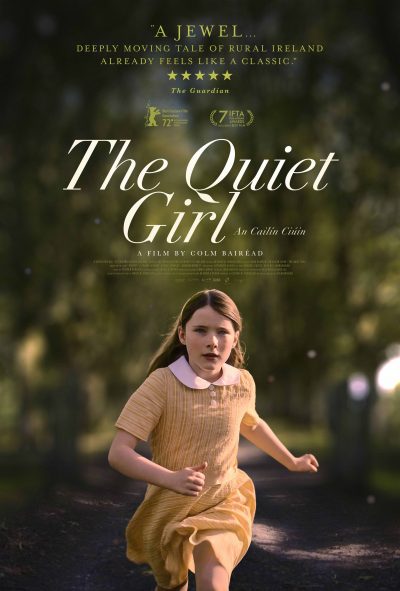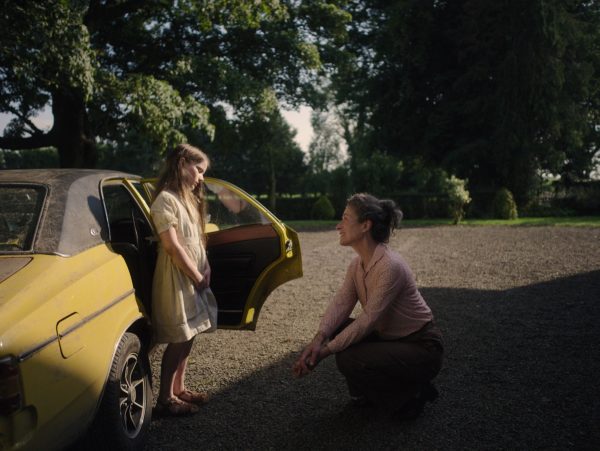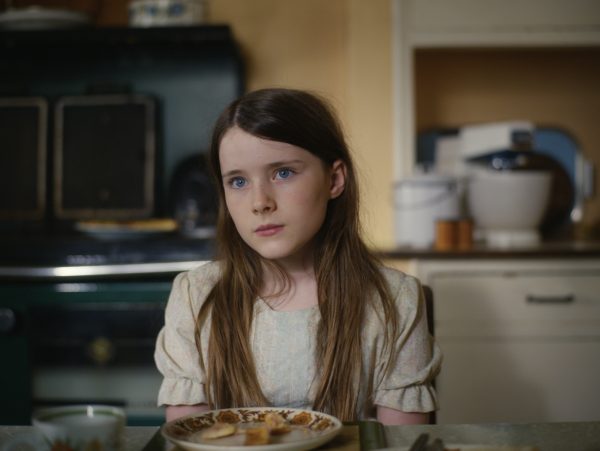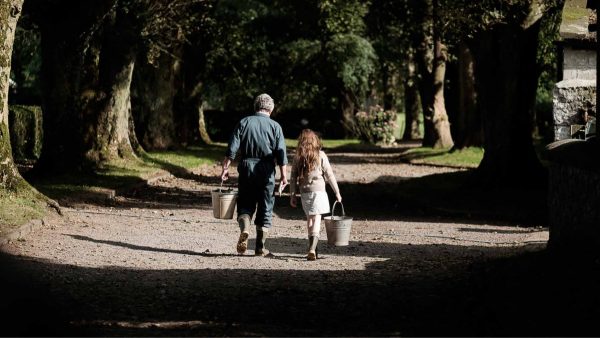
“The Quiet Girl” (“An Cailín Ciún”) (2022). Cast: Catherine Clinch, Carrie Crowley, Andrew Bennett, Michael Patric, Kate Nia Chonaonigh, Joan Sheehy. Director: Colm Bairéad. Screenplay: Colm Bairéad. Book: Claire Keegan, Foster (2010). Web site. Trailer.
That intentional neglect wears on Cáit, who increasingly shrinks away from others as she quietly and sadly tries to figure out what’s going on around her. Her withdrawal often results in awkward behavior and neurotic clumsiness as she senses more and more that her parents, siblings and peers just don’t care about her, an assessment that, unfortunately, rings all too true. In fact, as Mam approaches the birth of yet another child, she reaches the point where she can’t deal with her daughter any more, even though Cáit’s not done anything inherently disruptive, annoying or inflammatory. And, after Mam discusses the issue with Da, they decide that they’d be best off sending Cáit away for the summer, at least until the baby is born. It’s a solution they believe to be best, the only downside being that Da resents having to make the five-hour drive to drop off his daughter at the home of her new caretakers.
Shortly thereafter, Cáit is left in the hands of Mam’s cousin, Eibhlín (Carrie Crowley), and her husband, Seán (Andrew Bennett), who live on a farm not unlike the one where the young lass came from (except that her cousins’ place is far more tidy and orderly). Eibhlín and Seán take an immediate liking to the new arrival. They see her as a reserved but sweet girl, despite the disdainful impression Da tries to convey about her. Needless to say, given these mixed signals, Cáit is unsure about what she’s getting herself into, but, once her father departs, circumstances begin to change drastically.

Under the tender, attentive care of Eibhlín and Seán, Cáit finally begins to receive the kind of loving and nurturing that she wasn’t receiving at home. Admittedly, she’s somewhat apprehensive about it at first, considering that she’s never been the beneficiary of such attention. Yet, slowly but surely, it allows her inner warmth to emerge, a quality that both bolsters her sense of self-worth and brings profound (and apparently renewed) joy into the lives of her caretakers, who are still recovering from a painful tragedy of their own. The members of this new de facto family all benefit tremendously from one another’s company, and, even though not everything goes perfectly, their respective circumstances vastly improve, making everyday living far more enjoyable and fulfilling than any of them have experienced in a long time – or ever.
As the summer winds down, however, the time approaches for Cáit to return home, something that everyone quietly dreads. Cáit, Eibhlín and Seán have found genuine happiness during their time with one another, and they’re not anxious to see it end. Likewise, they each can’t imagine what life is going to be like with a return to the way things were before they spent their time together. Indeed, the threat of losing all the good they built with one another hangs over them like a dagger, and, as they make the five-hour journey back to Cáit’s home, the prospects of what comes next are all that any of them can think about.
Given the unrelenting despair that Cáit initially experiences, she might legitimately begin to believe that there’s no other way to live. The anguish, disappointment and neglect that she repeatedly endures are so pervasive that they could well be taken as a given, a fate to which she must become reconciled. However, at the same time, when she sees others living lives different than that, some part of her must become convinced that alternatives are indeed possible. The question, of course, is how does she access them? And, as the story begins to unfold, she gradually comes to discover that the answers are closer at hand than she might have allowed herself to believe.
That word – “believe” – is crucial to unlocking this puzzle. In light of the unending ordeals that she’s been subjected to, Cáit’s initial belief about the world is that these conditions intrinsically provide the basis of her existence. However, when she sees the lives of others and compares them to her own experience, some part of her consciousness must begin to believe that she can tap into those alternatives as well. And, once she allows herself to buy into that notion, doors begin to open up to take her to them. Those altered beliefs provide access to new opportunities, new ways of living far different from what she has been accustomed to. That shift is made possible by the conscious creation process, the philosophy that maintains our reality is shaped by the power of these intangible resources, for better or worse. And, even if she’s not aware of this school of thought, as her odyssey plays out, she begins to understand how its principles work and how she can make use of them to forge a new life for herself.

That, obviously, is manifested through her stay with Eibhlín and Seán, who show her an entirely different way of living. The love and nurturing she experiences under their care illustrate how life can change in ways that are more suitable than what she has typically known. As she becomes accustomed to this, she embraces it as a new given, one that effectively allows her to shed what no longer serves her – the old way of life that she has left behind. And, considering what she receives in return for making this adjustment, it’s more than an equitable exchange. It’s no wonder that she’s reluctant to return to her old life when the summer is over.
A comparable change occurs for Eibhlín and Seán, too. Given the pain they endured after their personal tragedy, a huge void was left in their lives – and their hearts. That’s where Cáit’s entrance into their existence comes into play. She helps to fill that gaping hole in their everyday lives, giving them purpose and someone to whom they can share the wellspring of love that they have to offer. Cáit gives as much to them as they give to her, and all it took for Eibhlín and Seán to realize this was a comparable change in their beliefs in this regard, the result being a win-win for everyone.
This scenario illustrates what’s possible when like-minded individuals combine their efforts in an act of co-creation. By aligning their beliefs and pooling the power behind them, such acts of collaboration can yield remarkably satisfying and fulfilling outcomes. I’m sure that Cáit, Eibhlín and Seán would heartily concur with this conclusion in light of what they jointly brought into being. And, by doing so, they set a valuable example for those looking to do the same, no matter how daunting or unlikely the circumstances may seem at the outset.
Of course, making this happen requires a degree of faith in being able to realize the desired outcome. That can certainly test one’s resolve, whether working individually or jointly with others. But, as noted earlier, when we observe others achieving what they seek to attain, that knowledge can quietly and significantly bolster our convictions, enabling us to empower those beliefs toward fulfillment.
This can be challenging, however, especially when we’ve been a party to creations that ultimately prove unsatisfying. In fact, one might legitimately wonder why anyone would manifest such questionable outcomes in the first place, an argument with genuine merit. Indeed, why would Cáit, Eibhlín and Seán saddle themselves with such circumstances? But, then, as many of us often discover, experiencing the absence of what we want can help us to envision – and appreciate – what’s missing, especially when the desired results at last materialize. Cáit, Eibhlín and Seán come to find this out for themselves, and, based on their reaction, it’s readily apparent how much they value what they’ve produced. We should all be so fortunate in our own endeavors.

Based on author Claire Keegan’s 2010 novella, Foster, “The Quiet Girl” addresses the impact that willful neglect can have on the impressionable among us (particularly children) and what can result when the issue is ameliorated through much-needed love, attention and nurturing. In that regard, writer-director Colm Bairéad’s debut narrative feature does a fine job in examining this matter. Set in 1981 with dialogue mostly in Irish Gaelic, this offering tells its story with ample sensitivity and compassion, augmented by gorgeous cinematography, a beautiful background score and fine performances by its ensemble cast. However, given that this film is based on a short work of fiction, the narrative is inherently a little thin, despite the palpable emotions it stirs. Because of that, the filmmaker tends to over-rely on such devices as frequent nature shots and emotive closeups to shore up the lean aspects of this story. There’s certainly nothing wrong with including elements like this; in fact, they provide viewers with more here than what most other comparable releases supply. But is this enough? Indeed, truly affecting domestic dramas are among my favorite types of films, and the director takes a noble stab at the genre in this release, one that’s tender and moving but that doesn’t quite land itself in masterpiece territory. Enjoy the picture for what it says and the message it seeks to convey, but be careful not to be taken in by the somewhat overblown hype that it has been accorded. As an offering that earned a BAFTA Award nomination for best adapted screenplay and BAFTA and Oscar nominations for best foreign film, I expected more, a tale that would truly have me more engaged and potentially on the verge of tears at any time, goals that came up a little short. The picture is playing theatrically.
Copyright © 2023, by Brent Marchant. All rights reserved.

No comments:
Post a Comment